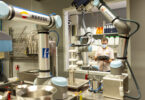Cremer, a 78-year-old-German family-owned business with more than 2,600 employees and over 60 global legal entities, produces cereals and other commodities, makes oleochemical products for global fast moving consumer goods companies and trades in products ranging from molasses to minerals. Faced with the dual challenge of how to become more sustainable and transition to future-ready business models, the company looked at how it could leverage its know-how to develop innovative new business models and fuel growth.
After sending its top executives through a program at UnternehmerTUM, The Center for Innovation and Business Creation at the Technical University of Munich (TUM), Cremer, with its business unit DTC (Deutsche Tiernahrung Cremer) the largest privately owned provider of animal feed in Germany, decided to branch out into sustainable nutrition for humans. Cremer has set up an alternative protein unit and is becoming an innovative partner for fermentation and precision fermentation startups that need its know-how and fermentation media supply chain network to make meat and dairy substitutes. The fermentation medium is of particular importance for productivity of fermentation and economic success of a bioprocess. Medium formulation addresses improvement of the nutritional and chemical environment of cells in a bioreactor and represents a significant cost and time factor in bioprocess development.
Cremer’s innovation journey – and how it is managing to bridge the old world and the new – provides some valuable insights into how traditional companies can transform their businesses.
“Cremer’s transformation illustrates that even century-old family businesses can reinvent themselves in the face of changing market dynamic,” says Stefanie Reifert, a senior consultant at UnternehmerTUM’s Business Creators. “The key takeaway for other family-owned businesses is to view their legacy not as a constraint, but as a foundation upon which to build new ventures. By leveraging their unique strengths and being open to collaborations with startups, they can tap into new markets and drive innovation.”
It’s about striking a balance between preserving the core values that have contributed to the longevity of family-owned businesses and embracing the agility and creativity that startups bring along, says Reifert.
Food For Thought
“The challenge is how do we develop new revenue streams,” says Philipp Schwarz, Cremer’s head of corporate transformation. “Making the company future-ready is my job but innovation can only be released if everybody is encouraged to constructively question the status quo.”
That, as every company knows, doesn’t happen naturally. So, Cremer approached UnternehmerTUM in January 2022. Open innovation workshops were set up involving executives from several relevant Cremer business units as well as outside experts. “Before we started the open innovation workshops UnternehmerTUM interviewed interesting people at the edge of our business model, such as the head of digitalization of one of the major agricultural machinery manufacturer and other industry players and included them in these workshops to give a critical view of our business models,” says Schwarz. These outsiders came up with ideas that would not have been generated from within Cremer, he says.
“This really helped us evaluate the status quo, where we are and what the markets look like,” says Schwarz. “It made us think about what our worse competitors might look like and how they might threaten our business units and business models. Then, we were encouraged to think about how we might adopt some of these approaches.”
Ideas were considered and rejected before Cremer decided to create a new sustainable nutrition competence group. Sustainable nutrition “leverages a core competency in our whole business environment,” says Schwarz. “We were looking for a touch point that we could use in several different Cremer portfolio companies.”
Leveraging Core Strengths
One of Cremer’s strengths is a holistic view on nutrition and vegetable materials delivering nutrients. Until recently the focus was mainly on animal nutrition. This strength was the basis for the decision to dive deeper into the production of protein by fermentation. “In fermentation processes based on bacteria, fungi or yeast strains you need nutrients from different sources ,” says Dr. Heinrich Kleine Klausing, one of the managing directors of Cremer’s business unit DTC and accountable for R&D. Cremer realized it could use these strengths to participate in the development of these new ways to produce edible protein for humans, he says . “More or less all companies use edible sources – thus carbohydrates which are coming from corn, wheat or other grains and competing for use with human food,” he says. “Our target is to supply non-edible sources that can be used by the microbes or fungi.”
The non-edible sources used in the new approach still need balanced feed formulation, explains Kleine Klausing.”Development of balanced and efficiently working feed formulation is the focus of our daily work so we figured why not use this know how together with the right partners in fermentation?”
Cremer is doing exactly that with Austrian biotech startup Fermify, which claims to have cracked the continuous precision fermentation needed to create sustainable and economically viable solutions for milk protein production. Fermify , which was founded by scientist and serial entrepreneur Eva Sommer and her former professor Christoph Herwig, a professor of bioprocess technology at TU Vienna, specializes in the production of vegan casein protein, a key building block for cheese production. It makes its process available to cheese producers via a B2B platform, offering a fully automated production platform that enables casein protein production without animal ingredients on an industrial scale.
Cremer, based on its long experience and relationships as a B2B supplier of plant-based commodities and agricultural sidestreams, is working with Fermify on detecting and supplying the required substrates for fermentation, the so-called fermentation media. The German company has invested in this startup in July of last year and entered a strategic partnership with Fermify.
Expect more such agreements, says Kleine Klausing. “We are interesting for startups and corporates because we have expertise in the evaluation and supply of the different fermentation media they need. We are also positioning ourselves as a reliable partner in the development of balanced and efficiently working media formulation.”
To explore the growth potential of new protein sources and increase its exposure to startups Cremer Sustainable Nutrition, the company’s new business unit, last June launched a strategic collaboration with the food accelerator Food Harbour Hamburg. It is also part of Hamburg’s Next Commerce Accelerator, which connects startups with corporates.
The manufacturing of alternative proteins in different product areas is another way for Cremer to create new revenue streams in existing as well as new business areas, says Nils Rupp, Head of the new business unit Cremer Sustainable Nutrition.
In July of 2022 Cremer Sustainable Foods and Asia Sustainable Foods (ASF) Platform, a wholly-owned company of Temasek, announced the opening of a plant-based protein contract manufacturing facility in Singapore, The 11,000 square-foot facility is able to manufacture up to 1,300 tons of plant-based protein per year, which is equivalent to approximately 4.3 million chicken breasts, and is one of the largest High Moisture Extrusion (HME) contract manufacturing facilities in Singapore. HME is a nascent technology that allows the production of plant-based protein products that resemble meat more closely in texture and taste and are made with a climate-friendly list of ingredients.
Cremer has decades of experience in global contract and private label manufacturing. The new sustainable foods unit is positioned as a scale-up partner to help customers to “bridge the innovation gap between R&D and large scale production,” says Rupp. “With this offer brands and startups gain a manufacturing partner to produce innovation locally and sustainably. “
Fermenting Change
Cremer is positioning itself in what looks like a promising sector. The alternative protein market is estimated to surpass $290 billion by 2030, with the industry’s growth credited partly to its nutritional, environmental, sustainability and food security benefits, according to Boston Consulting Group.
Although the investment in Fermify is not Cremer’s first investment in a startup (it invested in another food startup in 2020) working with young outside companies is relatively new for the 78-year-old company. It is learning how to manage those relationships, says Schwarz. “We move pretty fast, we are a trading business, so we need to be fast,” he says. “And when it comes to investments and contracts, we try not to flood startups with paperwork. We build a story first – a strategic reason for working together – and then start the paperwork and not the other way around says Rupp.”
Getting people inside the company to accept change has not always been easy. “An important first step was to convince the teams in our traditional business units and getting them on board as supporters of this nutrition transformation process,” says Schwarz. The new unit acts as an “internal innovator to tell the story about this new opportunity and help people understand that even if something is not directly linked into a revenue stream right away and there is not demand right now there can be huge potential in the future. “
The bet is that the focus on sustainable food will lead to sustainable growth. But the project with UnternehmerTUM is only a starting point, says Schwarz. The company is actively working on other innovation projects that could generate new revenue streams, including integrating a circular economy approach.
“Cremer is now, as are most other companies, in a continuous transition process due to the high speed of technological development that impacts our daily business,” says Schwarz. “Innovation cycles are become constantly shorter and business models need to transform and develop simultaneously.” Luckily, he says, fermenting change has now become a part of Cremer’s culture.
This article is content that would normally only be available to subscribers. Sign up for a four-week free trial to see what you have been missing.
To access more of The Innovator’s Innovation Strategy articles click here.





